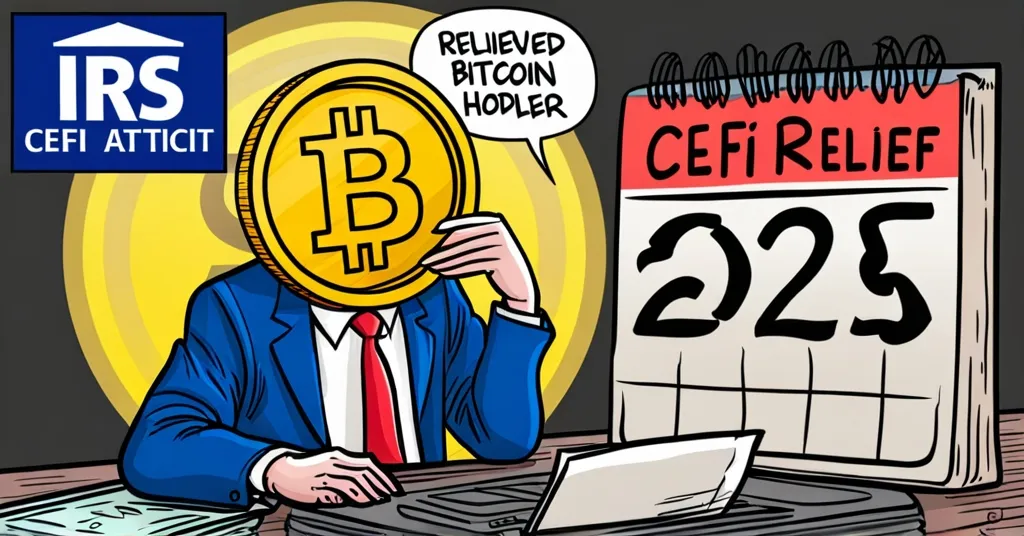IRS Grants Bitcoin Holders on CeFi Platforms Tax Relief Until 2025

IRS Grants Temporary Relief to Bitcoin Holders on CeFi Platforms Until 2025
The IRS has announced a temporary reprieve for Bitcoin and crypto holders on centralized finance (CeFi) platforms, providing relief from specific tax reporting rules until the end of 2025. This decision aims to ease the complexities of tax reporting challenges for cryptocurrencies on centralized platforms and accommodate the unique challenges faced by crypto investors.
- Temporary tax relief for Bitcoin holders on CeFi platforms.
- Relief lasts until 2025, easing tax reporting complexities.
- Aims to accommodate various accounting methods beyond FIFO.
Background on Crypto Taxation
Cryptocurrency taxation has been a thorny issue for both investors and tax authorities due to its rapid evolution and the pseudonymous nature of transactions. The Internal Revenue Service (IRS) has struggled to keep up with these developments, leading to a patchwork of regulatory frameworks. Centralized Finance (CeFi) platforms, which act as intermediaries in the crypto world, similar to traditional banks, have added another layer of complexity. These platforms offer services like lending and trading, but their integration with traditional financial systems has made tax reporting a daunting task for investors. For more insights, visit the IRS Bitcoin tax relief CeFi wiki.
Details of the IRS Relief
The IRS’s temporary relief specifically delays the implementation of the First In, First Out (FIFO) accounting method, which would have required centralized exchanges to default to FIFO for calculating capital gains. FIFO means that the first assets purchased are considered the first sold for tax purposes, potentially leading to higher tax liabilities in a volatile market. This delay until December 31, 2025, provides brokers with the breathing room needed to accommodate other methods like Highest In, First Out (HIFO) and Specific Identification (Spec ID). More details can be found in the IRS Issues Temporary Relief for Bitcoin Holders on CEFI Platforms Through 2025.
HIFO allows investors to sell their highest-cost assets first, potentially reducing their tax exposure. Spec ID, on the other hand, lets investors choose which specific assets to sell, offering even more control over tax liabilities. This flexibility is crucial for investors navigating the choppy waters of the crypto market. For further reading on this topic, check out IRS temporary tax relief for cryptocurrencies.
While this relief focuses on Bitcoin, it extends to all digital assets held on CeFi platforms, including other cryptocurrencies and stablecoins. The IRS has also finalized digital asset reporting regulations for brokers, effective for transactions in 2025, which include detailed reporting requirements and exceptions. These regulations clarify the treatment of stablecoins and non-fungible tokens (NFTs) and introduce de minimis exceptions for certain transactions. For more information on how this impacts Bitcoin holders, visit Impact of IRS tax relief on Bitcoin holders quora.
Market Reaction and Investor Confidence
The market has reacted positively to this delay, viewing it as a step towards greater stability and investor confidence. The IRS’s adaptability reflects a broader trend of regulatory bodies working to balance oversight with the operational realities of the crypto market. Shehan Chandrasekera, head of tax at Cointracker, has warned that the immediate application of FIFO could have disproportionately affected crypto taxpayers, potentially leading to substantial tax burdens. The temporary relief is seen as a lifeline for investors, allowing them more flexibility in managing their tax liabilities in a volatile market. For a deeper dive into the implications, see IRS temporary relief for Bitcoin on CeFi platforms until 2025.
Counterpoints and Criticisms
While this relief is welcome, critics argue it might delay the inevitable need for clearer, more permanent regulations. Some worry that this temporary fix could lead to further confusion and uncertainty in the long run. Additionally, the relief might be seen as a band-aid solution that doesn’t address the underlying complexities of crypto taxation. As Bitcoin maximalists, we celebrate this move as a step towards greater adoption and mainstream integration, but we must also acknowledge the need for a more robust regulatory framework that supports the principles of decentralization and financial freedom. Explore more perspectives on CeFi platforms and cryptocurrency taxation.
Future Implications
The IRS’s decision is part of a broader regulatory landscape adapting to the fast-paced world of cryptocurrencies. Legal challenges, such as those from the Blockchain Association and the Texas Blockchain Council, have highlighted the tension between regulatory oversight and the operational realities of the crypto market. Looking ahead, further refinements are expected, particularly with the implementation of the OECD’s crypto-asset reporting framework (CARF), which could impact non-US brokers and the global approach to crypto taxation. For more on future regulatory approaches, read future regulatory approaches to cryptocurrencies by the IRS.
This move by the IRS is a clear signal that the regulatory landscape is evolving. While it provides much-needed clarity and relief for the time being, it also raises questions about the long-term regulatory approach to cryptocurrencies. As decentralization continues to challenge traditional financial systems, this temporary relief is a reminder of the ongoing battle between innovation and regulation.
Key Questions and Takeaways
- What is the purpose of the IRS’s temporary relief for Bitcoin holders on CeFi platforms?
The purpose is to simplify tax reporting and provide clarity for Bitcoin holders on centralized finance platforms.
- How long will this temporary relief last?
The relief is set to last until 2025.
- What challenges does the IRS face in regulating cryptocurrencies?
The IRS faces challenges due to the complexities and uncertainties surrounding the tax treatment of cryptocurrencies, especially when held on centralized platforms.
- What does this relief indicate about the future of cryptocurrency regulation?
It indicates a potential shift towards more accommodating regulatory approaches to cryptocurrencies, though long-term strategies remain uncertain.
- How might this relief impact Bitcoin holders on CeFi platforms?
It could ease the tax reporting burden and provide more clarity, allowing Bitcoin holders to better manage their tax obligations.
As we continue to navigate the evolving landscape of cryptocurrency regulation, this temporary relief from the IRS is a beacon of hope. It’s a reminder that while the path to mainstream adoption may be fraught with regulatory hurdles, there’s a willingness to adapt and accommodate the needs of crypto investors. But let’s not get too comfortable; the future of crypto regulation is still unwritten, and the fight for decentralization and financial freedom continues.
Editorial Note: At Let’s Talk, Bitcoin, we champion decentralization and the need for a balanced perspective on all crypto developments. This temporary relief is a step forward, but the journey towards a fully decentralized financial future continues.



